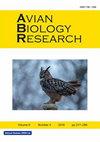Interspecific differences in brood desertion by female diving ducks in relation to duckling age and environmental conditions
IF 1.2
4区 农林科学
Q4 AGRICULTURE, DAIRY & ANIMAL SCIENCE
引用次数: 0
Abstract
Studies on brood desertion in birds have been mainly conducted on species with biparental care, and less often on uniparental species. Females of many duck species remain with their ducklings, unassisted by males, during variable periods of time before the chicks can fledge. In this paper, we examined factors that influence brood desertion by female red-crested pochards (Netta rufina), common pochards (Aythya ferina) and white-headed ducks (Oxyura leucocephala) during a 10-year period in lakes in southern Spain that experienced interannual variations in water levels. At an interspecific level, we found that brood desertion was less frequent in the species that nested earlier (red-crested pochard), while it was more frequent in the species that nested later (white-headed duck). Larger (older) ducklings were deserted more frequently than smaller ones in the three species. However, an interaction between flooding conditions in wetlands and species identity on brood desertion, after accounting for chick age, suggests that there were variations between the ducklings of the three species in their requirements for maternal care, conditioned by environmental conditions. Therefore, our study indicates that environmental conditions may affect parental care. A longer duration of brood attendance by female ducks may buffer against adverse effects of environmental conditions.母潜鸭弃雏的种间差异与鸭龄和环境条件的关系
关于鸟类育婴遗弃的研究主要针对双亲照料的物种,而很少针对单亲物种。在雏鸭羽化之前的不同时期,许多鸭子物种的雌性在没有雄性帮助的情况下与雏鸭呆在一起。在这篇论文中,我们在西班牙南部经历了水位年际变化的湖泊中,研究了影响雌性红冠麻鸭(Netta rufina)、普通麻鸭(Aythya ferina)和白头鸭(Oxyura leucoccephala)在10年期间弃育的因素。在种间水平上,我们发现窝弃在较早筑巢的物种(红冠麻鸭)中不太常见,而在较晚筑巢的物种中(白头鸭)则更常见。在这三个物种中,体型较大(年龄较大)的小鸭子被遗弃的频率高于体型较小的小鸭子。然而,考虑到雏鸟的年龄后,湿地的洪水条件和幼崽遗弃的物种身份之间的相互作用表明,受环境条件的影响,这三个物种的雏鸟对母亲护理的需求存在差异。因此,我们的研究表明,环境条件可能会影响父母的照顾。母鸭育婴的持续时间较长,可以缓冲环境条件的不利影响。
本文章由计算机程序翻译,如有差异,请以英文原文为准。
求助全文
约1分钟内获得全文
求助全文
来源期刊

Avian Biology Research
农林科学-奶制品与动物科学
CiteScore
1.50
自引率
0.00%
发文量
17
审稿时长
2 months
期刊介绍:
Avian Biology Research provides a forum for the publication of research in every field of ornithology. It covers all aspects of pure and applied ornithology for wild or captive species as well as research that does not readily fit within the publication objectives of other ornithological journals. By considering a wide range of research fields for publication, Avian Biology Research provides a forum for people working in every field of ornithology.
 求助内容:
求助内容: 应助结果提醒方式:
应助结果提醒方式:


